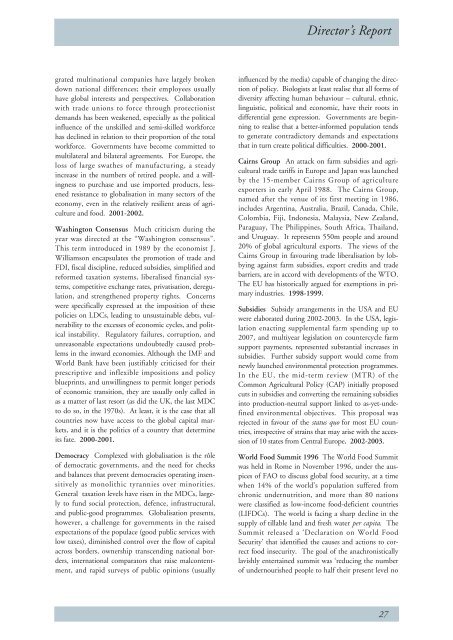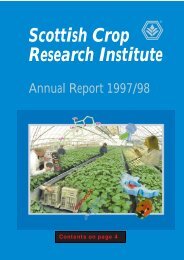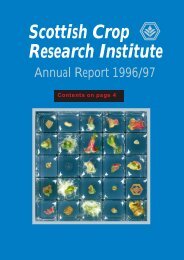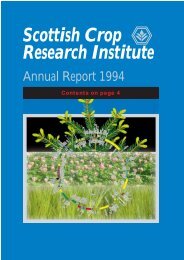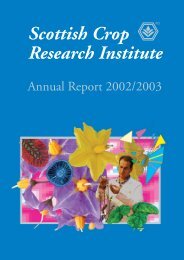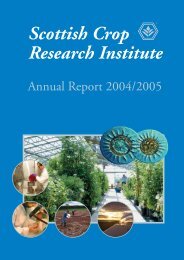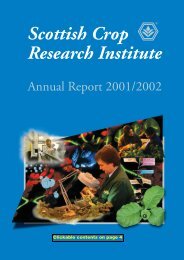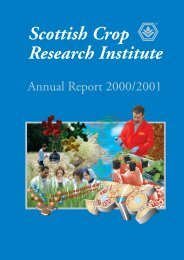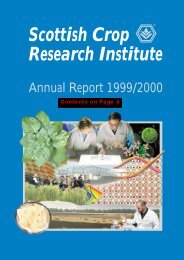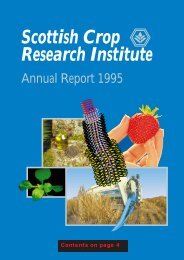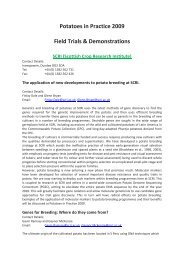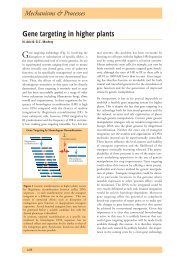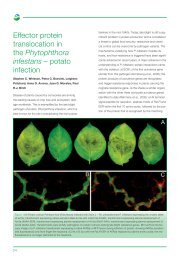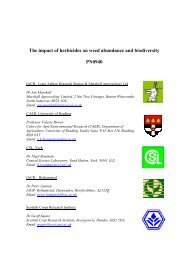SCRI Annual Report 2003/2004 - Scottish Crop Research Institute
SCRI Annual Report 2003/2004 - Scottish Crop Research Institute
SCRI Annual Report 2003/2004 - Scottish Crop Research Institute
You also want an ePaper? Increase the reach of your titles
YUMPU automatically turns print PDFs into web optimized ePapers that Google loves.
Director’s <strong>Report</strong><br />
grated multinational companies have largely broken<br />
down national differences; their employees usually<br />
have global interests and perspectives. Collaboration<br />
with trade unions to force through protectionist<br />
demands has been weakened, especially as the political<br />
influence of the unskilled and semi-skilled workforce<br />
has declined in relation to their proportion of the total<br />
workforce. Governments have become committed to<br />
multilateral and bilateral agreements. For Europe, the<br />
loss of large swathes of manufacturing, a steady<br />
increase in the numbers of retired people, and a willingness<br />
to purchase and use imported products, lessened<br />
resistance to globalisation in many sectors of the<br />
economy, even in the relatively resilient areas of agriculture<br />
and food. 2001-2002.<br />
Washington Consensus Much criticism during the<br />
year was directed at the “Washington consensus”.<br />
This term introduced in 1989 by the economist J.<br />
Williamson encapsulates the promotion of trade and<br />
FDI, fiscal discipline, reduced subsidies, simplified and<br />
reformed taxation systems, liberalised financial systems,<br />
competitive exchange rates, privatisation, deregulation,<br />
and strengthened property rights. Concerns<br />
were specifically expressed at the imposition of these<br />
policies on LDCs, leading to unsustainable debts, vulnerability<br />
to the excesses of economic cycles, and political<br />
instability. Regulatory failures, corruption, and<br />
unreasonable expectations undoubtedly caused problems<br />
in the inward economies. Although the IMF and<br />
World Bank have been justifiably criticised for their<br />
prescriptive and inflexible impositions and policy<br />
blueprints, and unwillingness to permit longer periods<br />
of economic transition, they are usually only called in<br />
as a matter of last resort (as did the UK, the last MDC<br />
to do so, in the 1970s). At least, it is the case that all<br />
countries now have access to the global capital markets,<br />
and it is the politics of a country that determine<br />
its fate. 2000-2001.<br />
Democracy Complexed with globalisation is the rôle<br />
of democratic governments, and the need for checks<br />
and balances that prevent democracies operating insensitively<br />
as monolithic tyrannies over minorities.<br />
General taxation levels have risen in the MDCs, largely<br />
to fund social protection, defence, infrastructural,<br />
and public-good programmes. Globalisation presents,<br />
however, a challenge for governments in the raised<br />
expectations of the populace (good public services with<br />
low taxes), diminished control over the flow of capital<br />
across borders, ownership transcending national borders,<br />
international comparators that raise malcontentment,<br />
and rapid surveys of public opinions (usually<br />
influenced by the media) capable of changing the direction<br />
of policy. Biologists at least realise that all forms of<br />
diversity affecting human behaviour – cultural, ethnic,<br />
linguistic, political and economic, have their roots in<br />
differential gene expression. Governments are beginning<br />
to realise that a better-informed population tends<br />
to generate contradictory demands and expectations<br />
that in turn create political difficulties. 2000-2001.<br />
Cairns Group An attack on farm subsidies and agricultural<br />
trade tariffs in Europe and Japan was launched<br />
by the 15-member Cairns Group of agriculture<br />
exporters in early April 1988. The Cairns Group,<br />
named after the venue of its first meeting in 1986,<br />
includes Argentina, Australia, Brazil, Canada, Chile,<br />
Colombia, Fiji, Indonesia, Malaysia, New Zealand,<br />
Paraguay, The Philippines, South Africa, Thailand,<br />
and Uruguay. It represents 550m people and around<br />
20% of global agricultural exports. The views of the<br />
Cairns Group in favouring trade liberalisation by lobbying<br />
against farm subsidies, export credits and trade<br />
barriers, are in accord with developments of the WTO.<br />
The EU has historically argued for exemptions in primary<br />
industries. 1998-1999.<br />
Subsidies Subsidy arrangements in the USA and EU<br />
were elaborated during 2002-<strong>2003</strong>. In the USA, legislation<br />
enacting supplemental farm spending up to<br />
2007, and multiyear legislation on countercycle farm<br />
support payments, represented substantial increases in<br />
subsidies. Further subsidy support would come from<br />
newly launched environmental protection programmes.<br />
In the EU, the mid-term review (MTR) of the<br />
Common Agricultural Policy (CAP) initially proposed<br />
cuts in subsidies and converting the remaining subsidies<br />
into production-neutral support linked to as-yet-undefined<br />
environmental objectives. This proposal was<br />
rejected in favour of the status quo for most EU countries,<br />
irrespective of strains that may arise with the accession<br />
of 10 states from Central Europe. 2002-<strong>2003</strong>.<br />
World Food Summit 1996 The World Food Summit<br />
was held in Rome in November 1996, under the auspices<br />
of FAO to discuss global food security, at a time<br />
when 14% of the world’s population suffered from<br />
chronic undernutrition, and more than 80 nations<br />
were classified as low-income food-deficient countries<br />
(LIFDCs). The world is facing a sharp decline in the<br />
supply of tillable land and fresh water per capita. The<br />
Summit released a ‘Declaration on World Food<br />
Security’ that identified the causes and actions to correct<br />
food insecurity. The goal of the anachronistically<br />
lavishly entertained summit was ‘reducing the number<br />
of undernourished people to half their present level no<br />
27


